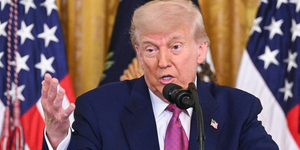Laszlo Lengyel: China's imperial century
If the 20th century belonged to America, the 21st will be China's. This will be the case even if China does not defeat America economically, politically, nor - let us hope - militarily, and only succeeds in counterbalancing it as a world power. To quote from Csaba Gombar, the development of the world follows the sun, passing from the Greeks to Latin Europe, thence to England, then to America's east coast, then to its west coast. And now it has reached Asia.
© AP |
The British economic Historian Niall Ferguson and John Mearsheimer, the Chicago political scientist both expect China to develop at a dramatic pace in coming decades, closing in on the US in economic terms, even confronting the US militarily if it gets in China's way.
"It will be Godzilla, not Bambi," in Merasheimer's words. There is little reason for hope, he says - all pretenders to the throne seem peaceful, before they resort to brutal force, and China will be no different.
Zbigniew Brzezinski, Jimmy Carter's national security adviser, disagrees with the above views. China has no interest in a war, he says. Recently, the Chinese politburo asked two western professors to analyse the rise and fall of nine great powers since the 15th century.
This was an eye-opener for the power elites of the country, Brzezinski says, adding that the Beijing Olympcs in 2008 and the Shanghai World Exhibition in 2010 will prove to the world what China is capable of.
In 2005, China had only 24 ballistic missiles capable of reaching the US. (China last fought a war 30 years ago - for two weeks, against Vietnam, compared to the US's countless military actions).
I am with those who believe that the world will be drawn to three gravitational poles over the next decades: the US, the EU and China.
Three different kinds of attractive force: America's advantage is global competitiveness, its democratic institutions and its lifestyle.
The EU's is the model of integration it shows. China's is its growth dynamic, and the attraction exerted by its institutional solutions on the developing world.
© AP |
The Washington Consensus, based as it is on privatisation, deregulation and liberalisation, sets strict standards for its market institutions, while the Beijing Consensus is based on Asian rules that the Harvard Professor Robert Putnam describes as: "I'll do something for you now because maybe you can do something for me later." It would be a mistake to see China's policy of mass goods for raw materials or raw materials for development as a simple policy of mercantilism. The Chinese are building webs and thinking in the long term. They have no expectation of democracy and they aren't demanding loyalty from the local elites.
American-style globalisation expects every partner to meet certain democratic criteria, and does everything to make the local political and economic elites its servants or its ally. Everywhere, there is a pro-western, pro-American, party or tribe. Since Deng, China has done away with this. There are no ideological requirements. There is no Chinese model of democracy or dictatorships. You don't have to love the Chinese. You don't have to adopt their values. You don't have to fight for the world's proletariat under a Chinese flag. There is no war against terrorism. You can do what you like, politically, in your region or country. If you like, you can oppress your people, or if you prefer, you can be democratic. The rule is that you can only steal a certain percentage of that development, and that you should vote with China in the international institutions.
When I first went to China in spring 1987, a woman on a bicycle rushed towards me, so astonished was she at the sight of a white person. The streets were filled with bicycles, a few crowded buses spouted fumes, and the party leaders sat in the back of huge black limousines. But it was that visit that showed me that Soviet-style socialism was dead. On my most recent visit, I couldn't even cross the busy streets of Shanghai. There is no question that the post-2001 unipolar American world has also died.




















